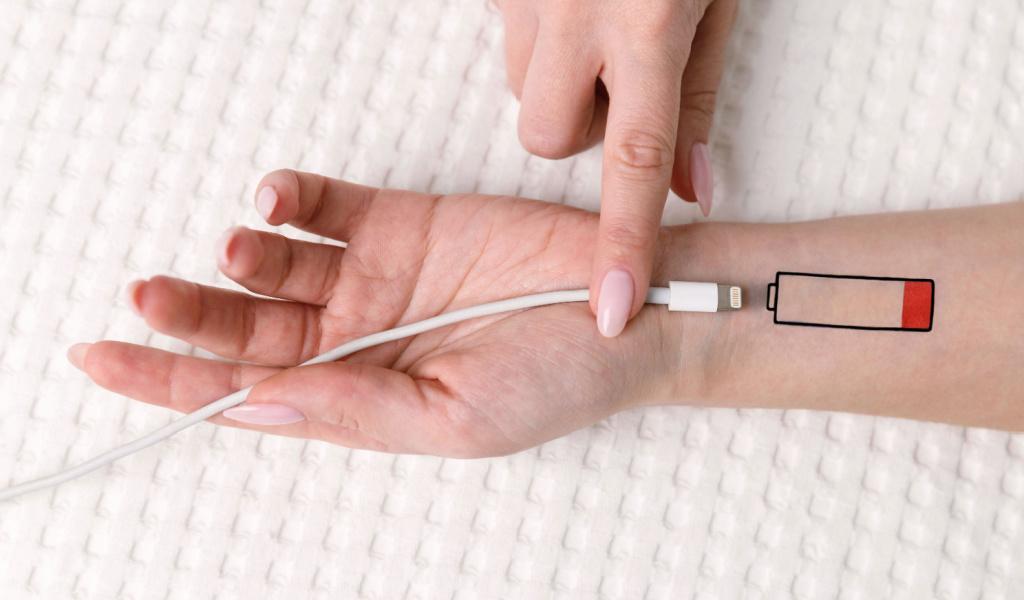Do you feel intensely tired, even after having a long night’s sleep? Do you find yourself reaching for the fifth cup of coffee just to keep yourself going till the end of the day? Or do you constantly feel bone tired that you can hardly do anything productively?
We all feel worn out at different points in our lives, but this kind of fatigue is more than just feeling sleepy; it’s this ongoing exhaustion that could be physical, emotional, or mental in nature and can’t necessarily be cured from a good night’s sleep.

What Is Chronic Fatigue or Tiredness?
Fatigue is when you feel constantly tired, weak, or lack energy. In and of itself, fatigue isn’t a health condition but a symptom of something else, often a combination of physical, social, psychological, and lifestyle factors. The causes of fatigue could be varied, such as an underlying illness, unhealthy lifestyles, or excessive burnout. Therefore, it’s crucial to identify the root of the issue so you can figure out ways to combat it. Here are some common symptoms of fatigue:
- Inability or difficulty in starting an activity.
- Subjective feeling of weakness.
- Feeling tired very easily.
- Feeling mentally drained.
- Difficulty in concentrating, remembering, or maintaining emotional stability.
Why Do I Feel Tired All The Time?
We all lead hectic lifestyles and it’s understandable to feel drained now and then. But when this constant fatigue starts to interfere with your ability to live a normal life and hinders you from completing day-to-day tasks, it’s time to pay close attention to your overall health. Here are some common reasons for feeling constantly tired:
Unhealthy Diet
A healthy, balanced diet is one that is formulated to make sure that your body gets the nutrients that it needs. When you deprive yourself of that, you run the risk of developing a vitamin or iron deficiency, which can contribute to weariness. Iron deficiency, more commonly known as anemia, is when your body does not produce sufficient red blood cells, which are needed to supply the right amounts of oxygen to the body. This can make you feel constantly exhausted.
Another cause for tiredness is overeating junk food or foods high in refined carbohydrates. These types of food cause your blood sugar to spike, leading to a surge of insulin to drop the sugar down. As a result, you may start to feel extremely tired and lethargic.
When you’re tired, you also crave a sugar rush, and giving into such cravings can only worsen the fatigue. To combat that, stock up on nutritious snacks and plant-based food to give that boost you need. There are many healthy snacking options; fruits and nuts are some of the most accessible!
Stress & Depression
Stress drains you physically and mentally. People with depression have trouble with sleep and often feel unmotivated and sluggish. They could feel empty and sad and lose interest in things they once enjoyed. Stress and depression also cause changes in appetite, bring on feelings of low self-esteem, and cause recurring thoughts of death or suicide.
If you believe you’re depressed, seek help from a therapist who can help you figure out your feelings and redirect your attention to something productive. Your doctor will also be able to advise you in case of any medication that might be required. Remember, leaving your depression untreated not only causes tiredness, but can also negatively impact every aspect of your life!
Poor Sleep
Lack of sleep is a common reason for feeling drowsy throughout the day. The average adult needs about eight hours of sleep per night. So, if you limit yourself to only getting a few hours of sleep a day, it can lead to feelings of extreme weariness. Exercising good sleeping habits such as having a regular bedtime, avoiding caffeine and alcohol, and turning off your screens before bedtime can help improve your quality of sleep and help stave off chronic tiredness.

Pregnancy
Pregnancy can cause a woman to feel extremely tired – and rightfully so! During pregnancy, you are growing another tiny human being inside your body, so your body is working extra hard to support your baby and yourself with energy and sufficient blood flow. Feeling tired, especially in the first trimester of your pregnancy, is normal and expected. Your body produces increased quantities of the hormone progesterone, especially in those first few months, which can make you feel extra tired.
Underlying Medical Conditions
If none of the above applies to you, but you’re still tired, then it’s probably time to talk to your doctor. Some common underlying medical conditions can lead to feelings of chronic tiredness. These include diabetes, hypothyroidism, sleep apnea, being overweight/underweight, or food intolerances.
Heart diseases and heart failure, in particular, can also make you feel tired all the time because the heart is weaker and has a tougher time pumping oxygenated blood to the muscles and tissues in the body. As a result, even regular everyday activities like walking the stairs or carrying the groceries from the car can become very difficult. It’s also understood that the symptoms of heart disease in women differ from those in men. The signs could be more subtle for women and present themselves as tiredness rather than chest pain. Generally, fatigue is ignored, which is why women are more likely to die from heart disease than men.
Moreover, there is a complicated medical disorder known as Chronic Fatigue Disorder. It is diagnosed when extreme feelings of persistent tiredness can sometimes be triggered by hormone imbalances, immune impairment, or a viral illness.
Bottom Line
When you feel persistent tiredness, understand that it’s your body’s way of telling you something is wrong. As discussed in this article, many medical conditions can cause fatigue. Still, if you feel that your tiredness is not normal and is affecting your quality of life, then it’s better to be safe and make an appointment with your healthcare provider. They will look into your family history of medical conditions, do a physical examination, and order any blood work to look for causes. Trying to figure it all out can be frustrating, but it’s necessary so you can follow up with the required treatment. At the same time, it’s essential to focus on eating a healthy diet, exercising more regularly, having better sleep habits, and de-stressing yourself!



